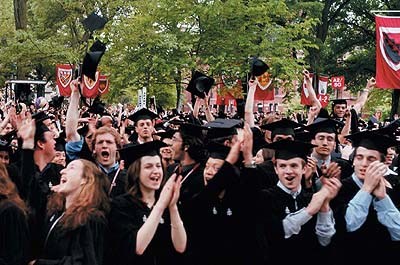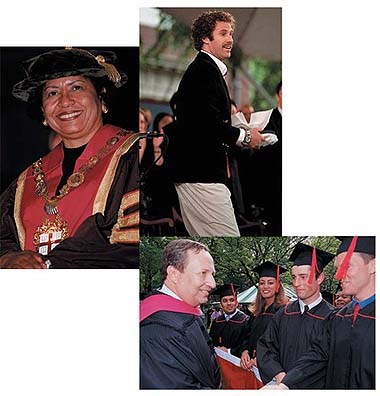One might have anticipated that the volumes of talk from Harvard podiums during Commencement week, so soon after the smoke cleared in Baghdad, would have been about the war, terrorism, and the role of the United States on the world's stage. But no. The strongest statement on these matters didn't come until the afternoon of Thursday, June 5, Commencement day itselfand then it came from a Mexican. At Radcliffe's fête on Friday, Canadian writer Margaret Atwood, A.M. '62, followed suit (see page 65).
The podium talk heard by multitudes began on Tuesday morning with an introspective speech by Ruth J. Simmons, Ph.D. '73, LL.D. '02, president of Brown University and this year's Phi Beta Kappa orator. Simmons, who is black, spoke of finding herself by losing herself in the study of French literature, of shaping an interior world where she would be free of segregation. Mary Oliver, the PBK poet, told graduating seniors, "Stay young forever in the wide fields of your mind."
 |
| Exsultate, jubilate. In Tercentenary Theatre, President Summers admits members of the College class of 2003 to "the fellowship of educated men and women." |
| Photograph by Jim Harrison |
President Lawrence H. Summers told seniors at their baccalaureate service in Memorial Church that afternoon to learn how to manage their time (better than he does) and to make private time for friends and family. The service was moved two hours later than usual, to 4 p.m., so that Summers could jet to and from Princeton to receive an honorary doctor of laws degree. His citation read in part: "As president of our pre-eminent sister institution on the Charles, he is now entrusted with assets more valued than goldstudents and scholars who will help shape the world's future."
Summers outlined ways in which he hopes to change how these intellectual assets are treated in his speech at the annual meeting of the Harvard Alumni Association in Tercentenary Theatre on Commencement afternoon (see page 63). He focused his remarks on the undergraduate curriculum, which has not been overhauled in 30 years: "[N]o organizationcertainly not one as creative as Harvard Collegeshould go more than a generation without reassessment and renewal."
Class Day speakers at the Law School (CNN's Larry King) and at the College (comedian Will Ferrell) came to entertain. Ferrell mentioned the war. Known for his impersonations of President George W. Bush, M.B.A. '75, on Saturday Night Live, Ferrell read a made-up letter from Bush to the class of 2003. "One of the challenges you will face is finding a job in our depressed economy," Ferrell intoned. "In fact, the chances of finding a job are about as good as finding weapons of mass destruction in the Iraqi desertslim and none, and slim just left the building."
The governor of Massachusetts, Mitt Romney, J.D.-M.B.A. '74 ('75), addressed the Kennedy School of Government. He assured the imminent graduates that the most fulfilling lives belong to people who look outward, to something larger than themselveswhether to family ties or a public missionwho choose to live by principle and who stand for something. Earlier in the week, Stephen Rosenfeld '53, retired deputy editorial-page editor of the Washington Post, observed darkly at a fiftieth-reunion symposium that "spin is a fact of life in journalism," and wondered aloud why there is even an expectation that people in power will tell the truth.
The Plummer professor of Christian morals, Peter Gomes, got Commencement day off to a geopolitical start in his chapel talk to seniors just before the splendid hoo-ha in Tercentenary Theatre. The essence of wisdom, he said, "is a becoming modesty that flies in the face of all the current temptations to power, imperialism, absolutism, and, dare I say it? moral arrogance....The nation and the world do not require more moral arrogance, the false assumption that one can recreate the world in one's own image. What we learn from the Jews, the Greeks, the Romans, and from practically every other encounter with the real world, is that moral modesty rather than moral clarity is the only hope that will save us from the inevitable cycle of decline and fall."
People at the Science Center and other venues watching the formal Commencement exercises on television (which has much to recommend it from a visual standpoint) could see that Charles B. Watson Jr. '03, of Currier House and Columbia, South Carolina, delivering the first of three traditional student "parts," the Latin Salutatory, was telling degree candidates to "go forward boldly and create a monument more lasting than bronze or marble" because a translation of his Latin flashed across the bottom of the screen like subtitles in a foreign film. Eric B. Hart '03, of Eliot House and Connell, Washington, urged civility in public discourse, and Elizabeth Carpenter, M.B.A. '03, of Wilmington, Delaware, explained what poems and discounted cash flows have in common (see page 62 for both speeches).
 |
| Ruth Simmons, of Brown; Will Ferrell, lately of Saturday Night Live; President Summers and 2003 class marshals, soon to be of the world. |
| Photographs by Jim Harrison |
At the Medical School, which has an afternoon speaker of its own, Paul Farmer, medical codirector of Clinique Bon Sauveur, a charity hospital in rural Haiti, laid a great burden on the shoulders of new graduates. They must see the world as it really is, burdened with global health inequities. "Now why dredge up this dreary stuff on a day of celebration?" he asked. "Because you, members of the class of 2003, can change all this. And you must." Maryknoll missionary William McIntire '53, A.M. '57, of Bangladesh, had said earlier in a symposium that the growing global disparity between rich and poor, rather than a clash of civilizations, is the greatest danger facing the world today.
In Tercentenary Theatre that afternoon, Ernesto Zedillo Ponce de León, former president of Mexico and now director of the Yale Center for the Study of Globalism, praised the United States for being the lead architect of important international organizations in the first half of the twentieth century, but scolded it for its current "aggressive unipolarity." "All the nations on earth, even the most powerful one, need the multilateral system," he said. "Can terrorism be defeated without international cooperation? Never." (Zedillo's speech will appear in the September-October print edition of this magazine.)





